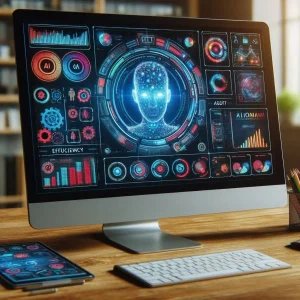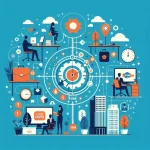Artificial Intelligence (AI) is revolutionizing various industries, and Human Resource Management Systems (HRMS) are no exception. The integration of AI in HRMS web applications is transforming how organizations manage their human resources, leading to enhanced efficiency, improved decision-making, and a more engaged workforce. In this blog post, we’ll explore the profound impact of AI on HRMS web applications and how it is reshaping the future of HR management.
1. Enhanced Recruitment and Talent Acquisition
AI-powered HRMS applications significantly streamline the recruitment process. They use sophisticated algorithms to scan resumes, match candidate qualifications with job requirements, and rank applicants based on their suitability. This not only speeds up the recruitment process but also ensures a more accurate selection of candidates. AI can also predict candidate success by analyzing historical hiring data, leading to better hiring decisions and reduced turnover rates.
2. Personalized Employee Experiences
AI enables HRMS applications to offer personalized experiences for employees. By analyzing individual preferences, behaviors, and performance data, AI can tailor training programs, career development plans, and wellness initiatives to meet the specific needs of each employee. This personalization fosters a more engaged and motivated workforce, as employees feel valued and supported in their career growth.
3. Efficient Performance Management
Traditional performance management systems often suffer from biases and inconsistencies. AI addresses these issues by providing objective, data-driven insights into employee performance. AI algorithms can analyze performance data, identify patterns, and provide actionable feedback. This helps managers make more informed decisions about promotions, raises, and professional development, leading to a fairer and more effective performance management process.
4. Proactive Employee Retention
One of the significant challenges for HR departments is retaining top talent. AI can predict employee turnover by analyzing factors such as job satisfaction, engagement levels, and career progression. By identifying at-risk employees early, HR can take proactive measures to address their concerns, provide necessary support, and improve retention rates. This predictive capability helps in maintaining a stable and satisfied workforce.
5. Streamlined Administrative Tasks
AI-powered HRMS applications automate repetitive administrative tasks, such as payroll processing, leave management, and benefits administration. This automation reduces the administrative burden on HR professionals, allowing them to focus on more strategic initiatives. Additionally, AI ensures that these tasks are performed with high accuracy and efficiency, minimizing errors and saving time.
6. Advanced Analytics and Insights
AI enhances the analytical capabilities of HRMS applications by processing vast amounts of data and generating valuable insights. These insights help HR professionals understand workforce trends, measure the effectiveness of HR initiatives, and make data-driven decisions. Advanced analytics powered by AI can uncover hidden patterns and correlations, providing a deeper understanding of workforce dynamics and enabling better strategic planning.
7. Improved Candidate and Employee Experience
Chatbots and virtual assistants, powered by AI, are transforming the candidate and employee experience. AI-driven chatbots can handle routine inquiries, assist with onboarding, and provide instant support, ensuring that candidates and employees receive timely and accurate information. This improves the overall experience and frees up HR professionals to focus on more complex tasks.
8. Bias Reduction in HR Processes
AI has the potential to reduce biases in HR processes significantly. By relying on data and algorithms rather than human judgment, AI can help eliminate unconscious biases in recruitment, performance evaluations, and promotions. This leads to a more diverse and inclusive workplace, where decisions are based on merit and performance rather than subjective factors.
The integration of AI in HRMS web applications is revolutionizing human resource management. From enhancing recruitment and performance management to improving employee retention and reducing administrative burdens, AI is driving significant improvements in HR processes. As AI technology continues to evolve, its impact on HRMS applications will only grow, offering even more sophisticated tools and insights for managing human resources effectively.
Organizations that embrace AI-powered HRMS applications will be better positioned to attract and retain top talent, foster a more engaged workforce, and make strategic decisions that drive business success. The future of HR management is here, and AI is leading the way.





